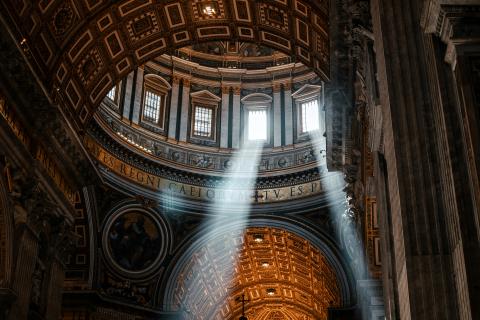
In the runup to today’s Thanksgiving celebration, the Wall Street Journal published a less than conventional recommendation for this time of year: “The Case for Being Ungrateful,” announced one of its headlines. “Forcing ourselves to be grateful when we don’t really feel it can be harmful to our mental well-being and our relationships,” the piece suggests, “This dark gratitude can prevent us from acknowledging, and addressing, the problems in our life.”
So what of today, certainly a day of “forced” gratitude if ever there was one? Is it a day of “tricking ourselves into positivity” if our circumstances are other than we would choose, if there are problems in our lives for which we don’t feel especially thankful?
A Christian standpoint would suggest otherwise. Our prevailing culture tends to view the whole of life as being comprised by this brief space of time between birth and death. As a result, everything needs to work itself out in this little timeframe – justice, happiness, success, fulfilment. But Christians know that this short time on earth is just a prelude – a prelude of immense importance for what it leads to, certainly, but one which is also expectedly and necessarily inadequate to satisfy the infinite desires of our immortal souls. Our firm, abiding stance of gratitude is not, therefore, a kind of self-hoodwinking. It’s an act of faith and hope, rooted in an unshakeable truth: we’ve been called into existence by a good God, and are being made to share in the gift of his own life more and more fully. So the chapters that take us to that final end will be full of all kinds of things – joy and suffering and stress and peace – but we know that we would be foolish to read only the first handful of them and complain that things are not at all resolved. We need to see the whole story, how all the chapters hold together, before making any sort of judgement about whether justice was done and a happy ending had. In the meantime, though, we do know their Author, are given his assurance when we ask for it, and can, therefore, rightly praise him for it.
Today’s holiday began as a Christian feast in the midst of a Christian culture. It doesn’t make a whole lot of sense outside of that context, and does risk making us into “Pollyannas” – people “out of touch with reality” – without it. It’s true that we shouldn’t try to trick ourselves into gratitude. But we should seek out the grounds for it. Fortunately, we have them: we are the recipients of an undeserved grace, that of our very lives; and on top of that we’ve also been given blessings and promises beyond our loftiest imagining. God has chosen us for himself, promising to resolve all of our joys and trials and hopes in our sanctification, and in the union of our very selves with him. Certainly that’s something to be grateful for everyday, even in the midst of burden and disappointment; and certainly it merits an expression of sincere, truthful, happy thanksgiving today.
As always, Catholics are given a unique opportunity for thanksgiving: the Eucharist.
The miracle that paved the way for the canonization of Pier Giorgio Frassati relates to a seminarian for the Archdiocese of Los Angeles. Learn more about it here.
A new report by Aid to Christians in Need confirms that North Koreans found to be in contact with Christians are sent to political prison camps.
Jihadist threats continue to impact Christians in Nigeria: "We are in trouble."


